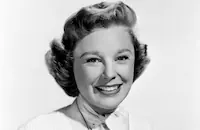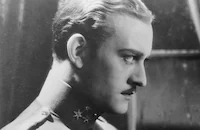A Stranger in My Arms
Cast & Crew
Helmut Kautner
June Allyson
Jeff Chandler
Sandra Dee
Charles Coburn
Mary Astor
Film Details
Technical Specs

Synopsis
During the Korean War, Air Force test pilot Maj. Pike Yarnell and navigator Donald Beasley survive a plane crash in the Pacific Ocean, but before they can be rescued, they spend twelve days floating in a raft, during which Donald dies. Upon his return to America, Pike flies recklessly, forcing his superior, Col. Bert Wayne, to ground him and question his ongoing depression. Pike responds that he need only obey orders, not reveal his troubles, and then reluctantly agrees to attend Donald's memorial in Georgia. Inside the hangar, Pike is disturbed to find Donald's widow Christina, whose letter asking for details of the accident he has ignored. Christina now asks Pike to visit her and Donald's parents, Harley and Virginie, after the memorial, but he curtly refuses. That night, Pike combs through Donald's dog tags, will and photo of Christina, which he hides in his drawer, and recalls their first days on the raft: Donald, a troublemaking soldier whom Pike had been assigned to retrieve from Japan, made a navigational error that caused their crash but now denounces Pike for their troubles. Fearing that they will never be rescued, Donald attempts to kill himself by attracting a shark, obliging Pike to save his life. In the present, Pike's tormented memories keep him from sleeping. At the Beasley estate in Georgia on the day of the memorial, Harley encourages Christina to move out instead of staying on the secluded estate to care for Virginie, but Christina demurs. Virginie, who claims to be invalid in order to keep Christina close to her, later implies that her grief is stronger than Christina's, who was married to Donald for only six weeks before his death. At the memorial, Christina spots Pike, causing her to falter in her speech. Virginie, taking note of her discomfort, takes over the sermon, and her praise of her son's bravery prompts Pike to remember Donald's cowardly despair during their days on the raft. After the service, Donald's wild younger sister Pat approaches Pike, who takes her to the local soda shop to discuss the family. Pat senses Pike's attraction to Christina but still flirts with him, hoping to appear mature. At Virginie's insistence, Christina locates Pike and invites him home, and he urges her to admit that she, as well as her in-laws, want him to come. Meanwhile, Harley appeals to Virginie to "let go of" Donald, but she vows to obtain for her son the Congressional Medal of Honor, knowing this will require that Pike vouch for Donald's extreme heroism. To that end, she calls her father-in-law, congressman Vance Beasley, to invite him to visit and bribe Pike for to testify that Donald acted heroically. Christina, Pat and Pike show up for tea, at which Pike tries to deflect the family's questions about Donald's last days. Virginie maneuvers to be alone with Pike to ask him about Donald's valor, and when Christina later interrupts, Virginie's domineering attitude causes Christina to flee outside, followed by Pike. Taking refuge under a tree, they wonder what Virginie is scheming, and despite Pike's insulting assertion that Christina did not really love Donald, she asks him to stay in Georgia. Drawn to her, he consents, and the next day kisses her after a horseback ride. At dinner that night, Vance questions Pike about Donald. Pike once again recalls the days on the raft: Donald, half mad with thirst and fear, declares he married Christina only to defy his controlling mother, who despised Christina's lower social standing. Drawn out of his reverie by Vance's assertion that Donald should receive the Medal of Honor, Pike angrily responds that the award is given only to the most outstanding soldiers. Vance offers Pike money to testify, causing the major to leave in anger. Christina follows and pleads for him to forgive them, but Pike believes that she was complicit in Virginie's plan. In response, Christina wonders why Donald, a champion swimmer, drowned on the raft while Pike survived. Pike explodes in anger, stating that Donald did not deserve a Medal of Honor, Christina is letting Virginie make her "a living monument" to her son, and Donald married her only to spite his mother. When Christina runs to Virginie demanding the truth, the dowager proclaims that she was against the marriage because it took Donald away from her. Christina subsequently moves into Pike's hotel, where they apologize to each other. Over coffee, Christina reveals that though she loved Donald, he could never return her passion, and her guilt over "failing him" has caused her to remain ensconced with his family. Pike tries to hold back his feelings for Christina but, overwhelmed, kisses her. At the hotel entrance Pat informs them that the Beasleys await them inside, and they agree to confront them. When Christine lashes out at Virginie for destroying Donald, Virginie collapses and Christina rushes to her aid. Pike accuses her of feigning the collapse, and in response to Virginie's assertion that Donald loved only her, reveals that Donald did not drown. Although Pike then regrets his honesty and lies that he killed Donald, Christina urges him to tell the truth, and Pike recalls Donald's death: After eight days without water, Donald writes a will and, crazed, accuses Pike of having power over him because of the gun he carries. Disgusted, Pike hands Donald the gun, and although Donald considers shooting Pike, instead he kills himself. Pike now hands the will to Harley, admitting that since that day he has regretted giving Donald his gun. Christina embraces him but, when Virginie declares her intent to accuse Pike of murder if Christina leaves, Christina considers staying to save Pike from Virginie's vengeance. In response, Harley tells Virginie that he will leave her, taking Pat, if she persists, and shows her Donald's will, which proclaims his hatred for his mother. When Virginie breaks down in tears, finally vulnerable, Harley promises to help her move on. As Virignie returns his embrace, Christina turns to Pike.

Director
Helmut Kautner
Cast

June Allyson

Jeff Chandler

Sandra Dee

Charles Coburn

Mary Astor

Peter Graves

Conrad Nagel
Hayden Rorke
Reita Green
Bartlett Robinson
Howard Wendell
George Chester
Karl Brindle
Jimmy Casino
Vera Burnette
Jack Davidson
George Hickman
Robert Strong
Ted White
Crew
Betty Abbott
Peter Berneis
Irvin Berwick
Phil Bowles
Rose Brandi
Leslie I. Carey
Ellis Coleman
William Dodds
Truman Eli
Ed Estabrook
Russell A. Gausman
Larry Germain
Joseph Gershenson
Alexander Golitzen
Frank Gross
Julia Heron
Ross Hunter
Virginia Jones
Robert Kyte
William Lambert
Nick Marcellino
Harold Mendelsohn
Wilbur Mosier
Ethel Neffers
Phil O'neil
Marie Osborne
Sergei Petschnikoff
Robert Pritchard
Richard H. Riedel
James Rogers
Clifford Stine
Bill Thomas
Bud Westmore
Monte Westmore

Film Details
Technical Specs

Articles
Sandra Dee, 1944-2005
She was born Alexandra Cymboliak Zuck on April 23, 1944 (conflicting sources give 1942, but the actual birth year has been verified by the family) in Bayonne, New Jersey. She was abandoned by her father by age five, and her mother, Mary Douvan, lied about Sandra's age so that she could put her in school and get a job. She was only five when she entered the 2nd grade. Mature for her age, Sandra's mother kept the lie going when she began her modeling career. With her fetching blonde curls and pretty face, Dee found herself moving up quickly on the modeling ladder. By the time she was 10, she was one of the top child models in the country, and by age 13, she met producer Ross Hunter, who signed her to a seven-year contract for Universal. She had her named changed to Sandra Dee (a stage name combining her shortened first name and using her stepfather's surname initial D to sign vouchers) and made her film debut in Until They Sail (1957), starring Joan Fontaine, John Gavin.
Her next film, The Reluctant Debutante, a bubbly romantic comedy with Rex Harrison, Kay Kendall and John Saxon, proved Dee to be adept in light comedy. Yet she would prove her versatility as a performer the following year - 1959, when she scored in the three biggest films of the year:A Summer Place, a brooding melodrama with fellow teen-heartthrob, Troy Donohue; Imitation of Life, a glossy, Ross Hunter sudser; and of course Gidget, the archetypical, sand and surf movie. By the dawn of the '60s, Sandra Dee mania ruled the movie fanzines worldwide.
Her personal life took a surprising turn when she hooked up with singer Bobby Darin. She met Darin in 1960 in Portofino, Italy, where they were both cast in Come September with Rock Hudson and Gina Lollobrigida as the older romantic couple. They eventually married and she gave birth to a son, Dodd Mitchell Darin in 1961. All the while, Dee still plugged away with a series of hit films over the next few years: Romanoff and Juliet a charming satirical comedy directed by Peter Ustinoff; Tammy Tell Me True with John Gavin (both 1961; If a Man Answers (1962) a surprisingly sharp comedy of manners with husband Bobby Darin; Tammy and the Doctor, another corn-fed entry that was her leading man's Peter Fonda's big break; and Take Her, She's Mine (1963), a rather strained generation-gap comedy with James Stewart.
Her success was not to last. By the late `60s, as "youth culture" movies became more confrontational and less frivolous with references to open sexuality and drugs in the American landscape, Dee's career began to peter out. Her few films of that period : Rosie, and Doctor, You've Got To Be Kidding (both 1967) were pretty dreadful and were disasters at the box-office; and her divorce from Bobby Darin that same year, put a dent in her personal life, so Dee wisely took a sabbatical from the limelight for a few years.
The '70s actually saw Dee improve as an actress. Although by no means a classic, her role as woman falling pray to a warlock (Dean Stockwell) who sexually and psychologically dominates her in the The Dunwich Horror (1970), was nothing short of startling. Yet despite her competency as actress, her career never regained its footing, and she appeared in only a few television movies later on: The Daughters of Joshua Cabe (1972), Fantasy Island (1977).
Dee resurfaced in 1991, when she gave an interview with People magazine about her personal demons: molestation by her stepfather, anorexia, drug use and alcoholism, that had haunted her her entire life. That same year, much to the delight of her fans, she resurfaced briefly when she starred in a stage production of Love Letters at the Beverly Hill's Canon Theatre with her friend and former co-star, John Saxon. Since she was diagnosed with throat cancer and kidney failure in 2000, Dee had been in and out of hospitals for her failing health. She is survived by her son Dodd; and two granddaughters -Alexa and Olivia.
by Michael T. Toole

Sandra Dee, 1944-2005
Quotes
Trivia
Notes
The working title of this film was And Ride a Tiger. During the first half hour of A Stranger in My Arms, details about "Pike Yarnell's" raft ride and "Donald Beasely's" death are revealed sporadically through flashbacks. According to November 1957 "Rambling Reporter" items in Hollywood Reporter, Ruth Gordon, Lynn Fontanne and Mildred Dunnock were considered for roles in the film. The Hollywood Reporter review noted that Mary Astor's autobiography was published at the same time as the movie's opening, garnering additional publicity for each.

Miscellaneous Notes
Released in United States 1959
CinemaScope
Released in United States 1959













